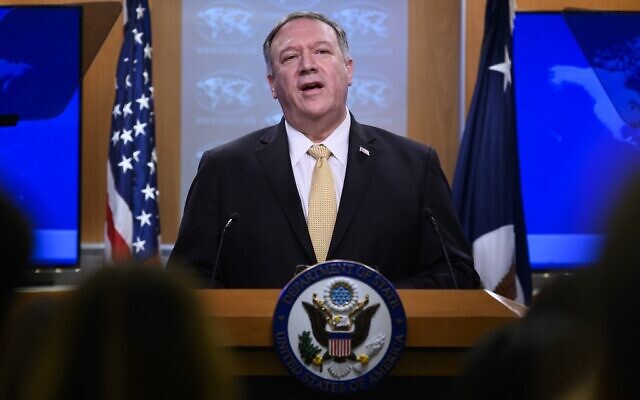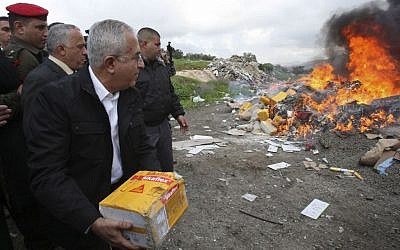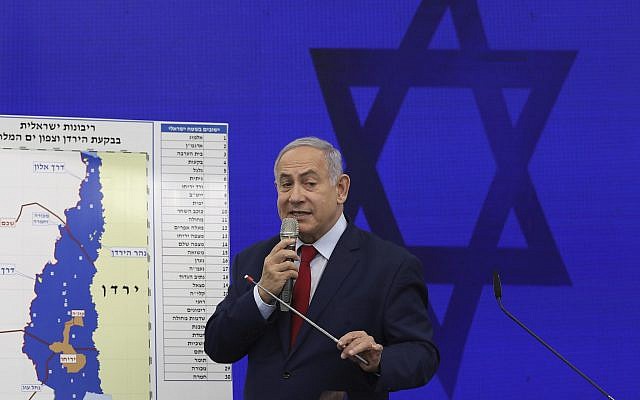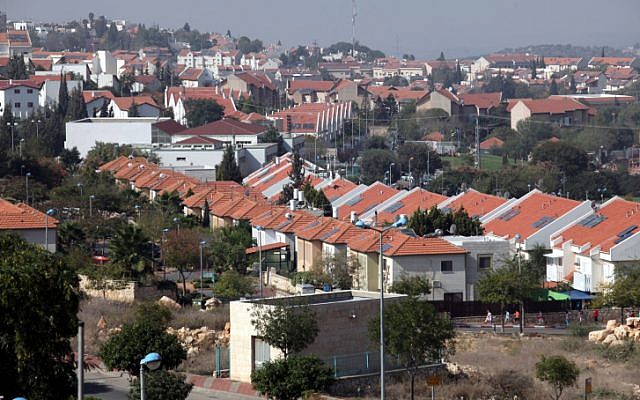Repudiating 1978 opinion that settlements are ‘inconsistent with international law,’ Secretary Pompeo tells press that previous designation ‘has not advanced the cause of peace’

WASHINGTON — Secretary of State Mike Pompeo announced Monday that the US is softening its position on Israeli settlements in the West Bank, the latest in a series of Trump administration moves that weaken Palestinian claims to statehood.
Pompeo repudiated a 1978 State Department legal opinion that held that civilian settlements in the occupied territories are “inconsistent with international law.” The move was welcomed by the government of Prime Minister Benjamin Netanyahu, angered Palestinians, and immediately put the US at odds with other nations working to end the conflict.
The Trump administration views the 1978 opinion, the basis for long-standing US opposition to expanding the settlements, as a distraction and believes any legal questions about the issue should be addressed by Israeli courts, Pompeo said.
“After carefully studying all sides of the legal debate,” Pompeo told reporters, the United States has concluded that “the establishment of Israeli civilian settlements in the West Bank is not, per se, inconsistent with international law.”
“Calling the establishment of civilian settlements inconsistent with international law hasn’t worked. It hasn’t advanced the cause of peace,” Pompeo said.
“The hard truth is that there will never be a judicial resolution to the conflict, and arguments about who is right and who is wrong as a matter of international law will not bring peace.”
US moves that have weakened Palestinian efforts to achieve statehood have included President Donald Trump’s decision to recognize Jerusalem as Israel’s capital, the movement of the US embassy to that city, and the closure of the Palestinian diplomatic office in Washington. These moves have been widely, though not universally, welcomed in Israel.
“This policy reflects a historical truth — that the Jewish people are not foreign colonialists in Judea and Samaria,” Netanyahu said in a statement, referring referring to the West Bank by its biblical name.
Palestinian Authority President Mahmoud Abbas’ spokesman, Nabil Abu Rdeneh, condemned Pompeo’s announcement and said settlements are illegal under international law. “The US administration has lost its credibility to play any future role in the peace process,” he said.
Even though the decision is largely symbolic, it could give a boost to Netanyahu, who is fighting for his political survival after he was unable to form a coalition government following recent elections.
In addition, it could spell further trouble for the administration’s oft-promised peace plan, which is unlikely to gather much international support by endorsing a position contrary to the global consensus.

The Netanyahu government was dealt a blow on settlements just last week when the European Court of Justice ruled products made in Israeli settlements must be labeled as such.
Some Israeli politicians connected the US decision to the EU verdict, but officials in Jerusalem and Washington said the move had been planned for months.
An EU spokesperson said the Brussels body’s position remain unchanged. “All settlement activity is illegal under international law and it erodes the viability of the two-state solution and the prospects for a lasting peace.”
The 1978 legal opinion on settlements is known as the Hansell Memorandum. It had been the basis for more than 40 years of carefully worded US opposition to settlement construction that had varied in its tone and strength depending on the president’s position.

The international community overwhelmingly considers the settlements illegal. This is based in part on the Fourth Geneva Convention, which bars an occupying power from transferring parts of its own civilian population to occupied territory. Israel rejects the position that the territories are occupied, saying they were captured from Jordan in a defensive war.
In the final days of the Obama administration, the US allowed the UN Security Council to pass a resolution declaring the settlements a “flagrant violation” of international law.
Pompeo said that the US would not take a position on the legality of specific settlements, that the new policy would not extend beyond the West Bank and that it would not create a precedent for other territorial disputes, he said.
He also said the decision did not mean the administration was prejudging the status of the West Bank in any eventual Israeli-Palestinian peace agreement.
The shift is a victory for Netanyahu, a longtime booster of the settlements, and had been strongly supported by US Ambassador to Israel David Friedman and major Trump donor Sheldon Adelson. Friedman was a major fundraiser for the settlements before becoming ambassador.
It may be taken by Netanyahu and the settlement movement as a green light for additional construction, or even annexation, of lands claimed by the Palestinians for a future state.

In the immediate wake of the announcement, settler leaders urged the Israeli government to use the opportunity to annex parts of the West Bank.
Netanyahu had vowed to annex West Bank lands in the run-up to elections.
The anti-settlement monitoring group Peace Now, along with reporting by The Associated Press, has found a sharp increase in settlement planning and construction since Trump took office.
For Netanyahu, the welcome boost comes at a time when he has been weakened domestically by mounting legal woes and two inconclusive elections this year.
Unable to secure a parliamentary majority, Netanyahu is now anxiously waiting to see if his chief rival, Benny Gantz, can put together a coalition. If Gantz fails, the country could be forced into a third election with Netanyahu facing the distraction of a trial.
Gantz applauded Pompeo’s “important statement, once again demonstrating its firm stance with Israel and its commitment to the security and future of the entire Middle East.”
Pompeo dismissed suggestions that the decision would further isolate the US or Israel in the international community, though Jordan’s Foreign Minister Ayman Safadi wrote on Twitter that the settlements hurt peace prospects. “We warn of the seriousness of the change in the US position towards the settlements and its repercussions on all efforts to achieve peace,” he said.
Shortly after Pompeo’s announcement, the US Embassy in Jerusalem issued an advisory warning for Americans planning to travel in the West Bank, Jerusalem and Gaza, saying, “Individuals and groups opposed to (Pompeo’s) announcement may target US government facilities, US private interests, and US citizens.” It called on them “to maintain a high level of vigilance and take appropriate steps to increase their security awareness in light of the current environment.”
Israel captured the West Bank and East Jerusalem in the 1967 Mideast war and quickly began settling the newly conquered territory.
Today, some 700,000 Israeli settlers live in the two areas, which are both claimed by the Palestinians for their state.

After the war, it immediately annexed east Jerusalem, home to the holy city’s most important religious sites, in a move that is not internationally recognized.
But Israel has never annexed the West Bank, even as it has dotted the territory with scores of settlements and tiny settlement outposts.
While claiming the fate of the settlements is a subject for negotiations, it has steadily expanded them. Some major settlements have over 30,000 residents, resembling small cities and serving as suburbs of Jerusalem and Tel Aviv.
The Palestinians and most of the world say the settlements undermine hopes for a two-state solution by gobbling up land sought by the Palestinians.
Israel’s settlement activities have also drawn attention to its treatment of Palestinians.
While Jewish settlers can freely enter Israel and vote in Israeli elections, West Bank Palestinians are subject to Israeli military law, require permits to enter Israel and do not have the right to vote in Israeli elections.
As reported by The Times of Israel
